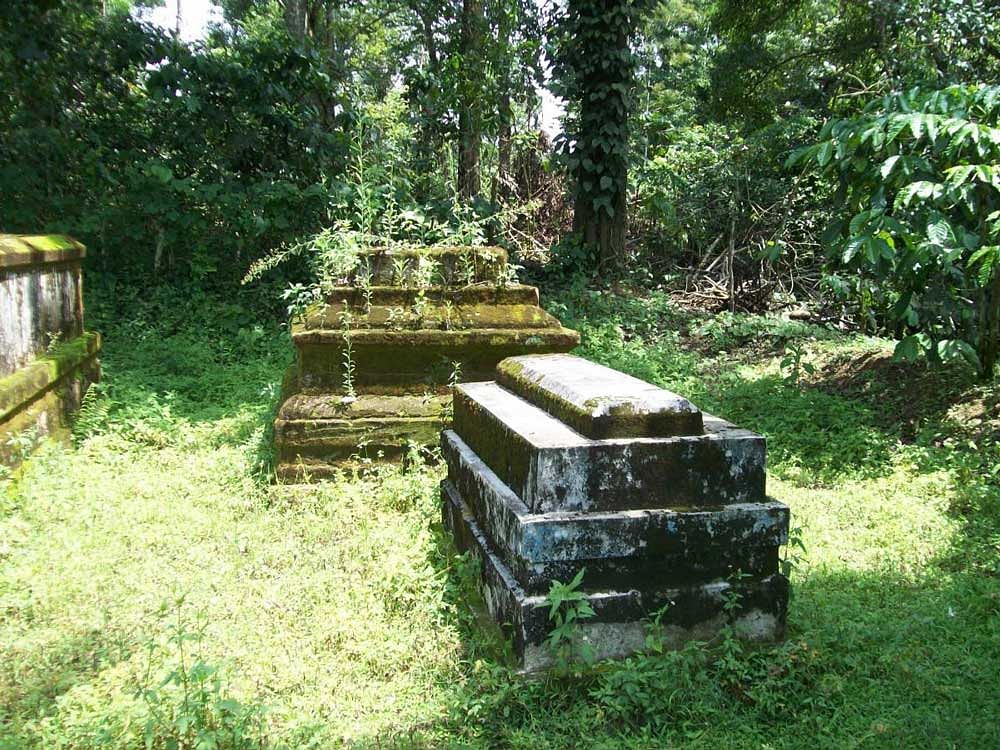A few of the families in Kodagu maintain the tombs of their distinguished ancestors. A few families are also in the possession of paintings of their ancestors being felicitated by the kings. A few others maintain artefacts such as oide katti, also known as a billhook-shaped war knive, with king’s insignia upon them.
The Thathanda family is one such family that received three of these honours.
They have their ainmane, or ancestral house, in Kuklur village of Virajpet taluk. Their ancestral house was formerly a mundu mane, a house with an open, central courtyard, which is called a mund. The sepulchre of their renowned ancestor Karyagara (officer) Thathanda Subbayya lies some distance away from the ainmane. It has a Nandi figure upon it. Beside this tomb is an unmarked grave. Both these tombs are within an enclosure.
Nearby in the same graveyard are two large graves. The names of two of the four buried there were not known to us. Clansman Thathanda Nanaiah explains, “Subbayya ajja’s (forefather) elder brother had a son who addressed ajja as kunjappa (one of the names for a paternal uncle). After ajja’s death, this nephew inherited his possessions. It is this nephew’s grave which lies beside the tomb of ajja and within the boundary. The two buried outside the boundary were clan elders, each called a pattedar. ”
According to his book, Kodagina Itihasa (1974), historian D N Krishnaiah came to learn of Karyagara Subbayya from the Thathanda elders. In 1811, two British officers General Welsh and Captain Williamson visited the court of the then king of Kodagu, Linga Rajendra. They were pleased with the hospitality offered. When the king heard the news of a rogue tusker, he proposed a hunt and his guests agreed. Thathanda Subbayya was given the responsibility of organising the hunt.
Accompanied by elephants and attendants, the hunting party set out to the jungle. In the trees and around a forest clearing, boxed seats made of cane were prepared. Ladders were used to reach it. The king, the two Englishmen and others settled themselves in the cane boxes. Kodava pikemen, with their long spears, would comb the jungle and drive the prey into the clearing during a hunt. Several drum beaters would aid the hunters by scaring the animals with their noise. This way, the wild tusker was driven into the clearing and shot dead.
Pleased with Subbayya’s arrangements, the king honoured him with a gold medal and gifted him a gun. Subbayya was also awarded a oide katti with the king’s insignia on it. A painting of Subbayya and the king was also gifted to him. However, some people grew jealous of Subbayya and schemed against him. The opportunity came when the king received complaints about cattle-stealing tigers.
A hunt was organised by Subbayya in order to eliminate the tigers. On the night before the hunt, Subbayya ensured that the cane seats were securely placed in the area where the hunt was to take place. When he left, his enemies loosened the seats. The next day, when the king shot a tiger, the seat he was on fell apart and he fell. Furious, he demanded to have the head of the man who had set up these seats. Subbayya was blamed for what was thought to be a shoddy work. As he was deep in the forest with the other hunters, the executioners were sent out to behead Subbayya.
One servant ran before them and told Subbayya everything that had transpired. Subbayya was unhappy as there was no way for him to prove his innocence. Subbayya told the servant to convey to the king that he had been framed and sent him back. As Subbayya did not want to be punished for a crime he did not commit, he shot himself. When the king came to know what had taken place, he was displeased. Subbayya was buried on his family farm. Enquiries were held and the king discovered that Subbayya was indeed innocent. The king had a mausoleum built over
Subbayya’s grave.
